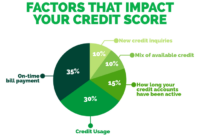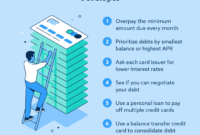Best credit cards for bad credit: Dive into the world of credit cards designed to help those with poor credit scores turn their financial situation around. Learn about the various options available and how they can benefit you.
Overview of Credit Cards for Bad Credit

Credit cards designed for individuals with bad credit are financial tools that allow people with less-than-perfect credit scores to access credit. These cards typically come with specific features tailored to help individuals rebuild their credit history and improve their credit scores over time.
Main Features of Credit Cards for Bad Credit
- Lower credit limits: Credit cards for bad credit often come with lower credit limits to minimize the risk for both the cardholder and the credit card issuer.
- Higher interest rates: Due to the higher risk associated with bad credit, these credit cards usually come with higher interest rates compared to traditional credit cards.
- Security deposits: Some credit cards for bad credit may require a security deposit to secure the credit limit, providing a level of protection for the issuer.
- Credit-building tools: Many credit cards for bad credit offer tools and resources to help cardholders improve their credit scores, such as credit monitoring services or educational materials.
Importance of Using Credit Cards for Bad Credit
Credit cards for bad credit play a crucial role in helping individuals rebuild their credit history and improve their credit scores. By using these cards responsibly, making on-time payments, and keeping credit utilization low, cardholders can demonstrate creditworthiness and gradually improve their credit standing.
Differences from Traditional Credit Cards
- Approval requirements: Credit cards for bad credit are more accessible to individuals with poor credit histories, as they typically have less stringent approval requirements compared to traditional credit cards.
- Higher fees: Bad credit credit cards may come with higher fees, such as annual fees or maintenance fees, to offset the increased risk associated with lending to individuals with bad credit.
- Rewards and benefits: Credit cards for bad credit often have limited rewards and benefits compared to traditional credit cards, as the focus is on credit-building rather than rewards programs.
Types of Credit Cards Available for Bad Credit

When it comes to credit cards for individuals with bad credit, there are primarily two types available: secured credit cards and unsecured credit cards. Each type has its own set of features and benefits that cater to different financial needs and situations.
Secured Credit Cards vs. Unsecured Credit Cards
Secured Credit Cards:
– Secured credit cards require a security deposit, which serves as collateral for the credit limit.
– These cards are easier to qualify for, making them a popular choice for individuals with bad credit.
– The security deposit reduces the risk for the issuer, allowing them to offer credit to those with a less-than-perfect credit history.
– Responsible use of a secured credit card can help individuals rebuild their credit over time.
– Some secured credit cards may offer the opportunity to upgrade to an unsecured card after demonstrating good credit behavior.
Unsecured Credit Cards:
– Unsecured credit cards do not require a security deposit and are granted based on the individual’s creditworthiness.
– These cards typically come with higher interest rates and fees compared to secured cards.
– Qualifying for an unsecured credit card with bad credit can be challenging, but not impossible.
– Responsible use of an unsecured credit card can also help improve credit scores and demonstrate financial responsibility.
– Some unsecured credit cards may offer rewards and benefits, such as cashback or travel perks, depending on the issuer.
Overall, secured credit cards are a great option for individuals looking to establish or rebuild their credit, while unsecured credit cards provide more flexibility and potential rewards for those with slightly better credit profiles. Choosing the right type of credit card depends on individual financial goals and credit history.
How to Choose the Best Credit Card for Bad Credit
When it comes to selecting a credit card for bad credit, there are several important factors to consider in order to make the best choice that suits your financial situation. By following a step-by-step guide and being aware of common pitfalls, you can ensure that you are making an informed decision.
Step-by-Step Guide, Best credit cards for bad credit
- Check your credit score: Before applying for a credit card, it’s essential to know your current credit score. This will help you determine which cards you are eligible for.
- Research different credit card options: Take the time to compare various credit cards designed for individuals with bad credit. Look at the interest rates, fees, and benefits offered by each card.
- Consider secured vs. unsecured cards: Decide whether you want a secured credit card (requires a security deposit) or an unsecured credit card (no deposit required).
- Read the terms and conditions: Make sure to carefully review the terms and conditions of the credit card, including the APR, fees, and any potential penalties.
- Apply for the card: Once you have chosen the best credit card for your needs, submit your application and wait for approval.
Factors to Consider
- Interest rates: Look for a credit card with a low APR to minimize the cost of borrowing.
- Fees: Pay attention to annual fees, late payment fees, and any other charges associated with the credit card.
- Rewards and benefits: Some credit cards for bad credit offer rewards programs or other perks that can help you save money or build credit.
- Credit limit: Consider the credit limit offered by the card and whether it meets your financial needs.
Tips to Avoid Common Pitfalls
- Avoid applying for multiple cards at once: Each credit card application can result in a hard inquiry on your credit report, which can lower your credit score.
- Pay your bills on time: By making timely payments, you can improve your credit score over time and qualify for better credit card offers in the future.
- Monitor your credit utilization: Try to keep your credit card balances low compared to your credit limits to demonstrate responsible credit usage.
Building Credit with a Credit Card for Bad Credit: Best Credit Cards For Bad Credit
Using a credit card for bad credit can be a valuable tool for individuals looking to improve their credit scores. By utilizing these cards responsibly, individuals can gradually rebuild their credit history and work towards a healthier financial profile.
Strategies for Responsible Credit Card Usage
- Pay on time: One of the most important factors in building credit is making timely payments on your credit card. Missing payments can have a negative impact on your credit score, so it’s crucial to pay at least the minimum amount by the due date.
- Keep balances low: Aim to keep your credit card balances low in relation to your credit limit. High credit utilization can signal financial instability to lenders and negatively affect your credit score.
- Avoid opening multiple accounts: While having a mix of credit types can be beneficial, opening multiple credit card accounts within a short period can lower your average account age and potentially harm your credit score.
- Monitor your credit report: Regularly check your credit report for any errors or discrepancies that could be impacting your score. Disputing inaccuracies can help improve your credit standing over time.
Success Stories of Credit Improvement
“After diligently using my credit card for bad credit and following responsible credit practices, I was able to see a significant increase in my credit score within a few months. It was a rewarding journey that taught me the importance of financial discipline.”
“I started with a secured credit card for bad credit and gradually built my credit by making consistent, on-time payments. Today, I have access to better credit options and have achieved a much-improved credit score.”
In conclusion, the best credit cards for bad credit offer a lifeline to those looking to rebuild their credit. By understanding the nuances of these cards and using them wisely, individuals can pave the way to a brighter financial future.
Finish your research with information from Forex trading for investors.



